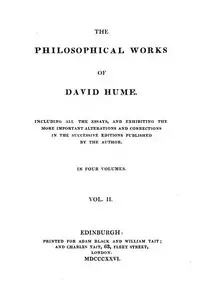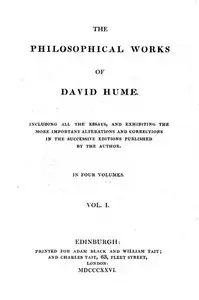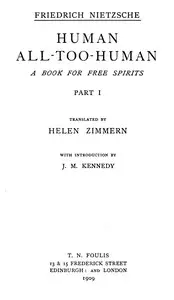"Philosophical Works, v. 2 (of 4)" by David Hume is a deep investigation into the core of human feelings. This book looks closely at how we feel pride and humility, breaking down the mental processes behind them to understand their origins, how they influence us, and how they connect to how we see ourselves and interact with others. Hume distinguishes between immediate and thoughtful impressions in our feelings. It argues that these emotions, though opposites, both target the self, with pride growing from positive self-views and humility from negative ones. The book shows that these feelings come from many places, like our traits, what we own, and our place in society. By focusing on the traits that bring us joy or pain and how they relate to our sense of self, the book builds a strong base for understanding the complexities of what drives our emotions.

Philosophical Works, v. 2 (of 4) Including All the Essays, and Exhibiting the More Important Alterations and Corrections in the Successive Editions Published by the Author
By David Hume
Discover how opposite feelings of self-worth shape our views and social lives through a thoughtful exploration of ego and lowliness.
Summary
About the AuthorDavid Hume was a Scottish philosopher, historian, economist, and essayist who was best known for his highly influential system of empiricism, philosophical scepticism and metaphysical naturalism. Beginning with A Treatise of Human Nature (1739–40), Hume strove to create a naturalistic science of man that examined the psychological basis of human nature. Hume followed John Locke in rejecting the existence of innate ideas, concluding that all human knowledge derives solely from experience. This places him with Francis Bacon, Thomas Hobbes, John Locke, and George Berkeley as an empiricist.
David Hume was a Scottish philosopher, historian, economist, and essayist who was best known for his highly influential system of empiricism, philosophical scepticism and metaphysical naturalism. Beginning with A Treatise of Human Nature (1739–40), Hume strove to create a naturalistic science of man that examined the psychological basis of human nature. Hume followed John Locke in rejecting the existence of innate ideas, concluding that all human knowledge derives solely from experience. This places him with Francis Bacon, Thomas Hobbes, John Locke, and George Berkeley as an empiricist.


















